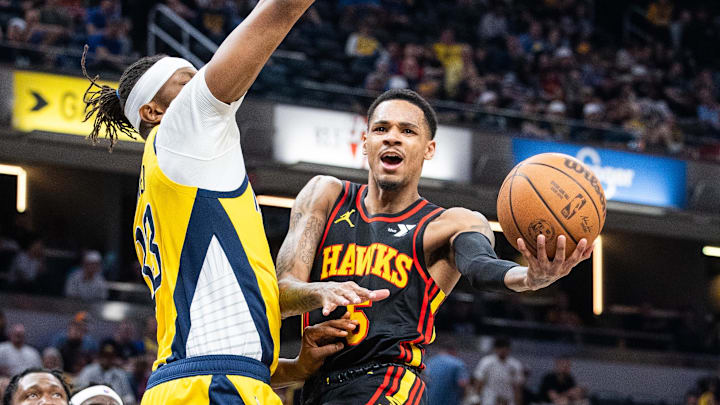Is The Hawks' Trade of Dejounte Murray Indicative of a New NBA?

The Atlanta Hawks trading Dejounte Murray this off-season was an eventuality that needed to happen. Last season proved that the fit between Murray and Young simply did not work well on the court. Both proved individually capable of powering the offense but struggled to find that same flow as a duo.
Sam Quinn of CBS recently talked about the Murray trade through a slightly different lens than many fans would have viewed it: what it reveals about the new CBA. The new CBA, or collective bargaining agreement, was signed in 2023 and led to several new restrictions on team building. Atlanta's decision to trade Murray may have been spurred by one of those restrictions.
"The Hawks traded Dejounte Murray for several reasons, but one of them, as Brian Windhorst noted on his Hoop Collective Podcast, was that there just wasn't value available for Trae Young and Atlanta had to move one of their guards. Young, aside from being a poor defender and tricky offensive fit on many teams, is notably on a 30% max rather than a 25% max because he met the Rose Rule criteria prior to his rookie extension kicking in. He's eligible for free agency in two years through a player option and will surely expect to be paid then."
First, it's important to define exactly what the Rose Rule is. It applies to a player finishing their rookie-scale contract who has met one of the three criteria:
- The player was named to an All-NBA team in the most recent season, or in two of the past three seasons.
- The player was named Defensive Player of the Year in the most recent season, or in two of the past three seasons.
- The player was named Most Valuable Player in any of the past three seasons.
Young made the All-NBA Third Team in 2021-22, which happened right before his rookie extension kicked in. As a result, his rookie extension went up to a five-year, $215 million dollar deal. He is owed $43 million in 2024-25, nearly $46 million in 2025-26, and has a player option worth $48.9 million. Quinn uses Young's contract as an example of the max being offered once a player passes a certain threshold of good play.
"And this is where we see a major divergence from CBAs past, because that openness used to extend pretty comfortably to the next two max contract tiers as well so long as the player was arbitrarily deemed max-caliber. Zach LaVine got a no-brainer five-year max. Bradley Beal got a five-year max with a no-trade clause. It's just generally been understood for most of NBA history that if you have a player that crosses a certain, undefined threshold of productivity, you pay him whatever it takes to stay and then you figure the rest out later."
It is true that under the new CBA, teams have to be much more careful about the max contracts that they give out. However, Atlanta giving Young a max contract extension and then not finding any trade partners for him is not a good example of that situation. At the time that he signed that extension, Young was coming off averaging 28.8 points and 9.5 assists on 55.1% true shooting. He was not the most efficient player and struggled with his three-point shot (31.3% on six attempts a game), but he showed that he was capable of being the offensive engine for a legitimate playoff team. It was also his first postseason appearance. Every NBA team would have given Young that contract. Quite frankly, it's ridiculous to pretend like Young's contract is a "bad" one. He is only 25 years old and has shown he is capable of being an offense unto himself. His defense and three-point shooting in the postseason can certainly be criticized, but putting his contract in the same conversation as LaVine's and Beal's is ridiculous.
To be clear, Quinn's broader point is that teams don't view veteran max players as very valuable anymore. Teams are going to be stuck with the max contracts they hand out - any doubts about whether the player is worth that contract mean that the contract is essentially untradeable. To an extent, I think this makes sense. However, I do think there will always be teams that take on financial risk in hopes of pursuing a championship with the mindset that it will pay off eventually. That number will certainly decline with the new CBA, but I do not think owners will ultimately stop pursuing players who have gotten max contracts and then garnered doubt about their play.
The Phoenix Suns are a premier example of this. They handcuffed themselves to Bradley Beal's contract because they believed his flaws as a player could be masked by the talent of the Devin Booker - Kevin Durant duo. While an argument could be made that the trade is the result of the old CBA mindset, owners will always want to make a big swing if it brings in more money. That could result in front offices being forced to overlook flaws in a player.
